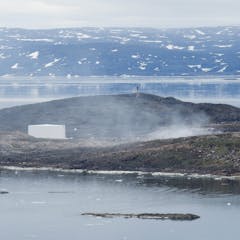
Articles on Ocean pollution
Displaying 1 - 20 of 37 articles

Over 200 million tonnes of sediment are transported by rivers to the sea each year, the most widespread water contaminant in the country. Its devastating impact on marine life has to be reversed.

Volunteers have been collecting and sorting washed-up rubbish on the beach for years. Thanks to their efforts, we have data on whether container deposit schemes help the issue.

Humans rely on the ocean for food, jobs and other resources, but these systems are being stressed to the brink.

Pam Longobardi collects and documents ocean plastic waste and transforms it into public art and photography. Her work makes statements about consumption, globalism and conservation.

Many countries export their plastic waste abroad – but the mismanagement of this plastic waste is one of the leading causes of plastic pollution in nature.

Facing human threats, Mumbai’s Koli community are taking risk reduction into their own hands – other vulnerable coastal settlements should take note.

The oceans bordering West African countries are in grave danger from pollution; checking further degradation is crucial for human survival.

When humans eat fish, mussels and other foods containing antibiotics, the residual antibiotics may cause bacterial pathogens to become resistant.

Priority should be given to improving municipal solid waste management in First Nation communities because they currently lack financial resources, infrastructure and solid waste diversion programs.

The thing that makes hooded blankets comfy and unnaturally soft is also what makes them bad for the environment and our health.

Indigenous marine governance is experiencing a revival throughout Oceania, building on traditional worldviews that acknowledge connections between people and all parts of ocean ecosystems.

The ocean moderates climate change by absorbing CO₂ emissions, hosts valuable biodiversity and provides food to millions, but all of these services are threatened by pollution and human activities.

Polluted oceans don’t just harm wildlife, they are a source of ill health for humans too.

An international agreement has set an ambitious deadline for action on some of the biggest problems facing the world’s oceans.

Plastic flows to the world’s waterbodies could double over the next two decades.

Empatheatre’s latest production is more than a play about three characters who live near the sea. It’s a model for collective consultation on how to save the ocean.

Where does plastic waste go when it reaches the ocean? For most of it, not far.

Urbanisation is the main reason for rising temperatures and water pollution, but receives little attention in discussions about the health of water streams, reefs and oceans.

While the world gathers to negotiate on climate change, governments must recognise the public desire for action on plastic pollution and work together to solve it.

Cleaning up plastic pollution in the ocean is good – and long overdue. But where will the waste go? Recycling isn’t always an option. Bacteria and enzymes could process it, raising new questions.
